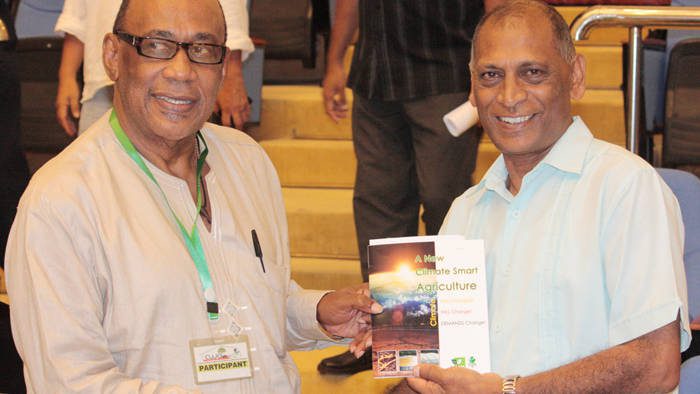GEORGETOWN, Guyana — Two leading agricultural organisations have launched a book on agriculture in a climate-change Caribbean environment.
The launch on Sunday, as part of Caribbean Week of Agriculture (CWA), comes as a leading agriculturalist says global climate change is one of the most serious threats to sustainable development in the region.
The publication, “Making Caribbean Agriculture Climate Smart was produced by the Technical Centre for Agricultural and Rural Cooperation (CTA) and the Caribbean Agricultural Research and Development Institute (CARDI), two of the major partners in CWA, which ends here on Saturday.
Dr. H. Arlington D. Chesney, executive director of CARDI, presented a copy of the booklet to Dr. Leslie Ramsammy, Guyana’s Minister of Agriculture, who delivered the key note address at Sunday’s event.
Chesney said the book is “a fitting output of the work we have been doing over the last three years on improving policy framework for developing climate change resilient systems in the Caribbean”.
He further stated that the publication presents a detailed analysis of a new climate smart agriculture.
It also provides information on the working of global climate change systems, factors that are changing the global climate, and indication and impacts of climate change.
The book also shares information on how climate change is threatening agriculture and food production systems, the various solutions and response options to deal with climate change and agriculture, and how CARDI is working with its partners to build a new climate smart agriculture.
Chesney thanked CTA for its support and member state for “walking with CARDI in this new and uncharted maze”.
Climate change threat
Chesney explained that global climate change is one of the most serious threats to sustainable development facing CARICOM states.
He said that although CARICOM states contribute “negligible” to green house gas emissions, the Inter-Governmental Panel on Climate Change has projected devastating impacts for the region.
The significance of Climate Change threat and the urgent need for response are emphasised in the CARICOM heads of Government Liliendaal Declaration on Climate Change in 2009, Chesney said.
“If Caribbean countries fail to adapt, they are likely to take direct and substantial economic hits to their most important industrial sectors,” Chesney said.
“One such important sector which is highly climate sensitive is agriculture. The region’s agriculture sector, already besieged by international economics threats, will find it difficult adapting to the impacts of climate change. This emphasises the need and urgency for actions aimed at developing climate smart agriculture.”
Chesney said that agriculture is on the frontline of climate change impacts and solutions.
“Food production systems, in particular, are expected to face devastating impacts from increasing temperatures and variable rainfall patterns, more extreme weather events, rising sea levels with salt water intrusion and increased incidents of pests.
“Therefore, it is critical to have a better understanding of how such impacts will affect agricultural productivity and food production,” Chesney said.
He said that making the agricultural and food production system and practice more resilient is challenging the paradigm of climate change, which will be essential for food and nutrition security.






